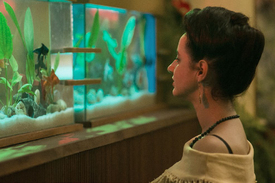Cinema Releases - The Invisible Life of Euridice Gusmao
Rio de Janeiro, 1950. Eurídice, 18, and Guida, 20, are two inseparable sisters living at home with their conservative parents. Although immersed in a traditional life, each one nourishes a dream: Eurídice of becoming a renowned pianist, Guida of finding true love.
In a dramatic turn, they are separated by their father and forced to live apart. They take control of their separate destinies, while never giving up hope of finding each other.
Winner of the Un Certain Regard prize at Cannes Film Festival 2019.
Brazil's entry for the Oscars 2020 International Film.
Cert 18
Week Commencing 20 November
Week Commencing 27 November
Week Starting 15th October
| Cine Lumiere | 17 Queensberry Place | London SW7 2DT | 020 7871 3515 | all week |
| ICA Cinema | The Mall | London SW1Y 5AH | 020 7930 3647 | all week |
| Curzon Bloomsbury | Brunswick Centre | London WC1N !AW | 08719 642838 | all week |
| HOME | 2 Tony Wilson Place | Manchester M15 4FN | 0871 902 5747 | all week |
| Barbican Cinema | Beech St | London EC2Y 8AE | all week | |
| Broadstairs Palace | Harbour St | Broadstairs CT10 1ET | 01843 865726 | all week |
| Glasgow Film Theatre | 12 Rose St | Glasgow G3 6RB | 0141 332 6535 | all week |
| Depot | Pinwell Rd | Lewes BN7 2JS | 01273 525534 | all weeek |
| IFI | 6 Eustace St | Dublin DO2 PD85 | 01 679 3477 | all week |
| Showroom | 15 Paternoster Row | Sheffiled S1 2BX | 0114 2757727 | all week |
| Watershed | 1 Canon's Rd | Bristol BS1 5TX | 0117 9275100 | all week |
| Filmhouse | 88 Lothian Rd | Edinburgh EH3 9BZ | 0131 2282688 | all week |
| Tyneside | 8-10 Pilgrim St | Newcastle NE1 6QG | 0191 227 5500 | all week |
| Dundee Contemporary Arts | 152 Nethergate | Dundee DD1 4DY | 01382 909900 | all week |
| Belmont Filmhouse | 49 Belmont St | Aberdeen AB10 1JS | 01224 343 500 | all week |
| Curzon Home Cinema | ||||
| BFI Player | ||||
Week Starting 22nd October
| ICA Cinema | The Mall | London SW1Y 5AH | 020 7930 3647 | 23/26-28 Oct |
| Broadway | 14-18 Broad St | Nottingham NH1 3AL | 0115 952 6611 | all week |
| Cine Lumiere | 17 Queensberry Place | London SW7 2DT | 020 7871 3515 | 23/10 only |
| Chapter | Market Rd | Cardiff CF5 1QE | 029 2030 4400 | all week |
| Plymouth Arts Cinema | PTavistock Place | Plymouth PL4 8AT | 01752 206114 | all week |
| Tyneside | 8-10 Pilgrim St | Newcastle NE1 6QG | 0191 227 5500 | 23,25,26,28 Oct |
| IFI | 6 Eustance St | Dublin DO2 PD85 | 01 679 3477 | all week |
| Exeter Phoenix | Gandy St | Exeter EX4 3LS | 01392 667080 | 22-25, 27 Oct |
| Curzon Home Cinema | ||||
| BFI Player | ||||
Week Starting 29 October
| ICA Cinema | The Mall | London SW1Y 5AH | 020 7930 3647 | 4 Nov |
| Ultimate Picture Palace | Jeune St | Oxford OX4 1BN | 01865 245288 | all week |
| Firstsite | Lewis Gardens | Colchester CO1 1JH | 01206 713700 | 1st-3rd Nov only |
| Curzon Home Cinema | ||||
| BFI Player | ||||
Week Starting 5th November
| ICA Cinema | The Mall | London SW1Y 5AH | 020 7930 3647 | 7 & 9 Nov |
| Ludlow Assembly Rooms | 1 Mill St | Ludlow SY8 1AZ | 01584 873 229 | 11th Nov only |
| Gulbenkian | Univeristy of Kent | Canterbury CT2 7NB | 01227 769 005 | 6th only |
| Buxton Film | Buxton Opera House | Buxton SK17 6BE | 01298 72050 | 8th Nov only |
| Hyde Park (at Pyramid Theatre/Leeds Univ) | Lifton Pl, Woodhouse | Leeds LS2 9JZ | 0113 380 100 | 8th Nov only |
| Curzon Home Cinema | ||||
| BFI Player | ||||
Week Starting 12th November
| Warwick Arts Centre | Univ of Warwick | Coventry CV4 7AL | 024 7652 4524 | 12-14 Nov |
| Filmhouse | Derngate | Northampton NN1 1TU | 01604 624811 | 14-15 Nov |
| Quad | Market Place Cathedral Quarter | Derby DE1 3AS | 01332 290606 | all week |
| Kiln Theatre | 269 Kilburn High Rd | London NW6 7JR | 020 7328 1000 | 17th,18th only |
| Curzon Home Cinema | ||||
| BFI Player | ||||
From 19th November onwards:
| Saffron Screen | Audley End Rd | Saffron Walden CB11 4UH | 01799 500238 | 29th Nov only |
| Cinemax Bantry | The Quay Bantry | Cork P75 YEO9 | 027 55777 | 7th Dec only |
| Robert Burns Centre | Mill Rd | Dumfries DG2 7BE | 01387 264808 | 13 Dec only |
| Curzon Home Cinema | ||||
| BFI Player |
Karim Aïnouz (born in Fortaleza, Brazil) is an award-winning film director, screenwriter and visual artist.
His first feature, Madame Sata, premiered in Cannes Un Certain Regard in 2002.
He also directed Love for Sale, 2006 (Venice Orizzonti), I Travel Because I Have To, I Come Back Because I Love You, 2009 (Venice Orizzonti), and The Silver Cliff, 2011 (Cannes Directors’ Fortnight).
In 2014 Futuro Beach screened in the Berlinale Competition. The documentary Central Airport THF, premiered at the 68th Berlinale (Panorama) and won the Amnesty International Prize.
Karim Aïnouz has directed, with Sergio Machado, the TV series Alice, for HBO Latin America. His installations and collaborative projects as a visual artist have been part of events such as Sharjah, São Paulo and Whitney Museum Biennials. He is also a screenwriting tutor at the Porto Iracema das Artes in Fortaleza, Brazil.
The Invisible Life of Eurídice Gusmão is his seventh feature. The film premiered in Cannes 2019 where it won the Un Certain Regard prize.
He has recently completed Nardjes A, a documentary film about the recent protest marches in Algeria and has several other film projects currently in place.
2019 The Invisible Life of Eurídice Gusmão
2017 Central Airport THF (Documentary)
2014 Futuro Beach
2011 Silver Cliff
2009 I Travel Because I Have To, I Come Back Because I Love You | co-directed with Marcelo Gomes
2006 Love For Sale
2002 Madame Satã
| CAST | |
| Eurídice Gusmão | Carol Duarte |
| Guida Gusmão | Julia Stockler |
| Antenor | Gregório Duvivier |
| Filomena | Bárbara Santos |
| Ana Gusmao | Flávia Gusmão |
| Zélia | Maria Manoella |
| Manuel | Antônio Fonseca |
| Cecilia | Cristina Pereira |
| Afonso | Gillray Coutinho |
| Eurídice | Fernanda Montenegro |
| CREW | |
| Director | Karim Aïnouz |
| Screenwriter | Murilo Hauser |
| Co-writers | Inés Bortagaray, Karim Aïnouz |
| Based on the book by | Martha Batalha |
| Cinematographer | Hélène Louvart (AFC) |
| Music | Benedikt Schiefer |
| Editor | Heike Parplies (BFS) |
| Production Designer | Rodrigo Martinera |
| Costume Designer | Marina Franco |
| Sound Designer | Waldir Xavier |
| Sound Operator | Laura Zimmerman |
| Makeup artist | Rosemary Paiva |
| Assistant director | Nina Kopko |
| Music | Benedikt Schiefer |
| Re-recording mixer | Björn Wiese |
| Producers | Rodrigo Teixeira, |
| Michael Weber, Viola Fügen | |
| Production Companies | RT Features, Pola Pandora |
| Sony Pictures, Canal Brasil | |
| Executive Producers | Camilo Cavalcanti |
| Mariana Coelho | |
| Viviane Mendonça | |
| Cécile Tollu-Polonowski | |
| André Novis | |
| Associate Producer | Michel Merkt |
| Funds | FSA/BRDE Ancine (BRA) |
| Medienboard (GER) | |
| 139 min Brazil / Germany / 2019 | |
| 2.39.1 / 5.1 | |
| Cert 18 |
★★★★★
"This delayed release of the winner of Un Certain Regard at the 2019 Cannes Film Festival was worth waiting for. An old-school, lush melodrama featuring long-suffering women, period costumes, and an epic temporal span that starts in Rio de Janeiro during the 1950's...strikes the perfect balance between awards bait and telenovela.
Cinematographer Helene Louvart - known for her collaborations with Agnes Varda, Claire Denis, and Alice Rohrwacher - finds a lavish seam to offset the miserabilism. Carol Duarte and Julia Stockler are movingly stoical. The screenplay, adapted by Murilo Hauser, Ines Bortagaray and director Karim Ainouz, is expertly calibrated. They don't make them like this any more."
Tara Brady, THE IRISH TIMES
★★★★"The movie is saturated with emotion and colour....this gorgeous and moving melodrama finds two women in 1950's Rio under suffocating family expectations - and sees what happens when they are defied.
"Sisters fight the pain of patriarchy...both the two female leads are terrific and there is a powerful intimacy here that is incredibly satisfying."
Cath Clarke, THE GUARDIAN
"Karim Ainouz's gorgeous melodrama The invisible Life of Euridice Gusmao...adapted from a popular novel by Martha Batalha, it's a story of sisterly love enduring across decades of misfortune and forced separation. It's the kind of story that might have been filmed as a sudsy "women's picture" in the golden age of Hollywood. Ainouz doesn't hold back on the emotion either: it tumbles forth with humid, sumptuous excess, the performances as grandly expressive as the swooning score and tropically hued, oil-painted cinematography."
Guy Lodge, THE OBSERVER
"Ainouz makes a triumphant return to feature films with this transcendent 'tropical melodrama' about the enduring bond between two not-so distant sisters,w hich won Cannes' Un Certain Regard prize.
The film is undoubtedly full-blooded, but that doesn’t mean it lacks subtlety or nuance; indeed, as it progresses through the 50s, chronicling the changes in the two siblings’ lives, it explores, to richly rewarding affect, notions of family and friendship, love and loyalty."
If this is melodrama, it is so only in the best sense of the word.”
Geoff Andrew, SIGHT & SOUND
"Karim Aïnouz’s lovely melodrama… gorgeous Brazilian movie…you may want to cry well before this deeply moving, slowly blood-boiling movie is through. The sins of the patriarchy are fairly out in the open in “Invisible Life” — Manuel’s dogmatic conservatism, Antenor’s man-child ignorance — but there are no easy or one-note villains. For the director as well as the audience, hating the men in this movie is of secondary importance to loving its women, as Aïnouz so clearly does."
"Aïnouz is working firmly and confidently in a grand tradition of melodrama; there’s a hint of Douglas Sirk, a master of the form, in his expressionistic use of color, particularly cool greens and warm reds, to heighten the intensity of his characters’ emotions."
"...it’s implicitly a story about innumerable unseen women, in 1950s Brazil and beyond, who have toiled and suffered, rebelled and prevailed."
Justin Chang, THE SAN DIEGO UNION TRIBUNE
"Out' Brazilian filmmaker’s masterpiece elicits tears and cheers…unfolds on screen like a great novel."
"The film may have an epic scope — it covers multiple years in the sisters’ lives — but it feels intimate and voyeuristic. Both Julia Stockler and Carol Duarte give excellent performances, playing characters who feel lived in. The actresses convey so much emotion and frustration as women who are shamed and repressed in this male-dominated society. Viewers will be rooting for them to reconnect."
The film generates dramatic tension during a moment that may have Guida and Eurídice unexpectedly crossing paths. The teasing scene, which takes place in a restaurant on Christmas Eve, is beautifully directed and packs an emotional wallop."
"A rich film that will reward patient viewers who love a juicy melodrama."
Gary M. Kramer, PHILADELPHIA GAY NEWS
"A haunting drama that quietly celebrates the resilience of women even as they endure beaten down existences."
"An affecting portrait of sisterhood divided."
David Rooney, THE HOLLYWOOD REPORTER
'In a melodrama, you might hope that things will be highly colored. But nothing quite prepares you for the ecstatic, chromatic intensity of Karim Aïnouz’s Invisible Life. To call the film a riot of color doesn’t begin to do it justice: color here doesn’t so much riot as surge, swoon, ebb and flow in a delirious tide of euphoria, and sometimes solemnity. I used the term ‘melodrama’ at the start, although it’s by no means certain that Invisible Life is one. You might call it that in the sense that its picture of women’s lives several decades ago echoes the Hollywood ‘women’s pictures’ of the 40s and 50s (rather than the more narratively-loaded Latin American telenovela tradition)."
"The film manages to make its leads work as teenagers and as somewhat older women battered by harsh experience, and they are both terrific."
"Visually, the film is a triumph not only for Aïnouz and Louvart, but for colorist Dirk Meier’s worth mentioning by name because in general, when it comes to film reviews, colorists really do live invisible lives.”
Jonathan Romney, FILM COMMENT
“Gorgeous Brazilian movie…you may want to cry well before this deeply moving, slowly blood-boiling movie is through. Directed by the gifted Karim Aïnouz, the movie tells the story of Euridice and Guida (Julia Stockler), two sisters in 1950’s Rio. It’s a drama of resilient women, thoughtless men and crushingly unrealized dreams, told with supple grace, deep feeling and an empathy that extends in every direction." Justin Chang, LOS ANGELES TIMES
Critic's Pick: "Sisterhood Is Stronger Than Patriarchy"
"Lush imagery and action...Its mix of vivid period detail and raw frankness about sexuality and poverty and women'suppresion is heady and bracing; its depiction of female friendship and love is pointedly ferocious." Glen Kenny, NEW YORK TIMES
"This year's Cannes Un Certain Regard winner is a nourishing melodrama elevated by Karim Aïnouz's singular, saturated directorial style."
"Crowd pleasing and emotionally assessible...a waking dream, saturated in sound, music and color to match its depth of feeling...“A tropical melodrama... Karim Aïnouz’s ravishing period saga lives up to the description — high emotion articulated with utmost sincerity and heady stylistic excess, all in the perspiring environs of midcentury Rio de Janeiro — while surprising with its pointed feminist politics and occasionally sharp social truths."
"This heartbroken tale of two sisters separated for decades by familial shame and deceit is...a florid sensory experience...his most crowd pleasing feature to date."
Guy Lodge, VARIETY
"Melodrama is a neglected genre, often delivered with a post-modern twist these days. Brazilian director Karim Aïnouz proves in this stirring, heart-wrenching period film that it can be served straight up and still work a treat. This tough, good-looking family saga...Aïnouz and his scriptwriters know full well that melodramas don't just get by on sympathy - they need our anger as well."
Lee Marshall, SCREEN INTERNATIONAL
"It is classic storytelling that will delight those who like their dramas full of twists and turns, with pain and anger, in a film that highlights the changing position of women in society."
Kaleem Aftab, CINEUROPA
"A beautifully shot, impeccability acted and emotionally potent family drama. Both Duarte and Stockler are magnetic on screen, delivering wonderfully observed and full bodied performances. Helene Louvart’s cinematography is sumptuous whilst Aïnouz steers a sympathetic and empathetic path through the lives of his heroines. At its heart, The Invisible Life of Euridice Gusmao is an elegant and emotive story about two women struggling to build a life for themselves."
Rob Aldam, BACKSTREET MAFIA
Download photos -
Download UK Pressbook
Download the international pressbook here
Quad poster - low res or high res
Upright poster image
Trailer on YouTube
Trailer ProRes size - download
Trailer as mp4 file - download
Shorter 58 sec trailer - download mp4
Download clip (.mov format)
Karim Ainouz onstage at Toronto - YouTube
Interview with Karim Ainouz here
Interview with Karim Ainouz here - DMovies








